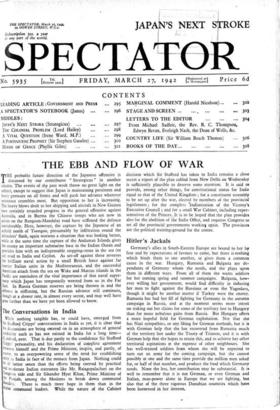The Conversations in India
While nothing tangible has, or could have, emerged from Sir Stafford Cripps' conversations in India as yet, it is clear that the discussions are being entered on in an atmosphere of general cordiality such as has not existed in India for a long time— if, indeed, ever. That is due partly to the confidence Sir Stafford CriPPs' personality, and his declaration of complete agreement between himself and the Prime Minister, inspire, and partly, of course, to an overpowering sense of the need for establishing unity in India in face of the menace from Japan. Nothing could be of better omen than the efforts being exerted by practical mxlerate Indian statesmen like Mr. Rajagopalachari on the Congress side and Sir Sikander Hyat Khan, Prime Minister of the .Punjab, among the Moslems to break down communal hostility. There is much more hope in them than in the titular communal leaders. While the nature of the Cabinet
decision which Sir Stafford has taken to India remains a close secret a report of the plan cabled from New Delhi on Wednesday is sufficiently plausible to deserve some attention. It is said to provide, among other things, for constitutional status for India equal to that of the United Kingdom ; for a constituent assembly to be set up after the war, elected by members of the provincial legislatures ; for the complete 'Indianisation of the Viceroy's Executive Council ; and for a small War Cabinet, including repre- sentatives of the Princes. It is to be hoped that the plan provides also for the abolition of the India Office, and requires Congress to set all the provincial governments working again. The provinces are the political training-ground for the centre.


























